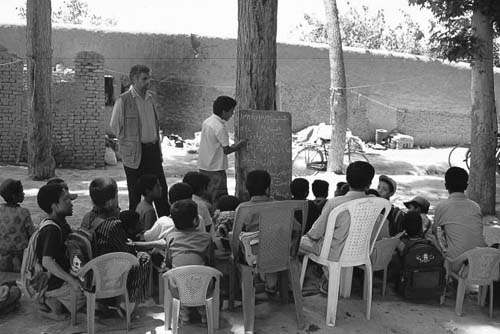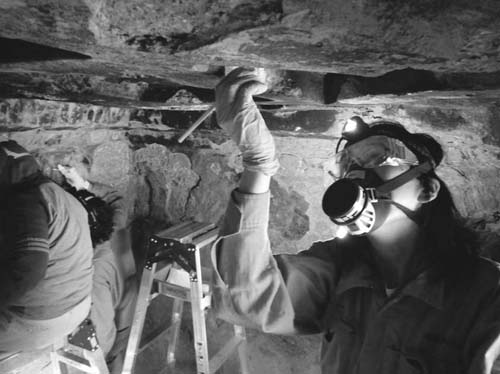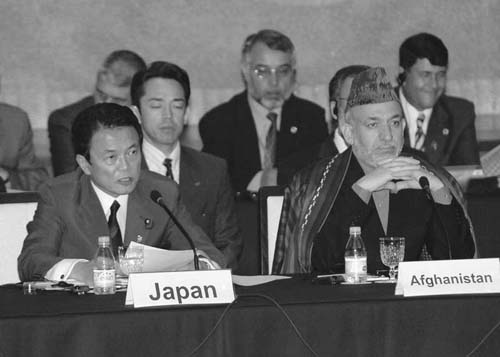Japan's Official Development Assistance White Paper 2006
Main Text > Part II ODA DISBURSEMENTS IN FISCAL YEAR 2005 > Chapter 2 Details about Japan's ODA > Section 2. Measures for Each of the Priority Issues > 4. Peacebuilding > (2) Afghanistan
(2) Afghanistan
Since its economic and social infrastructures and basic system of governance were destroyed due to civil conflicts that lasted over 20 years, Afghanistan has been continuing its efforts aimed at building a new nation. For roughly five years since the terrorist attacks in the United States in 2001, the Government of Afghanistan and the international community have been working together to revitalize the country.
Japan has continued to provide consistent assistance for the steps taken by Afghanistan over these five years. Japan's assistance is based on the idea that efforts for peace and reconstruction in Afghanistan lead to the peace and stability of the world as a whole, as well as the eradication and prevention of terrorism. Japan hosted the International Conference on Reconstruction Assistance to Afghanistan (Tokyo Conference) in January 2002. Here, Japan ensured assistance of over US$4.5 billion from the international community as a whole, and announced that Japan, for its part, would provide assistance of up to US$500 million over two and a half years. In addition to this, at the following International Conference on Afghanistan (Berlin Conference) held in March 2004, Japan announced its intention to extend an additional US$400 million over the following two years until March 2006. By January 2006 more than US$1 billion worth of assistance had already been implemented. Japan has been actively extending its assistance toward the reconstruction of Afghanistan and it intends to continue to do so in future.
Chart II-22 Breakdown of Support to Afghanistan

A. Assistance to Afghanistan
Japan's assistance to Afghanistan is based on the concept of the "consolidation of peace" as advocated in 2002 by the then Minister for Foreign Affairs Yoriko Kawaguchi, and is built upon three pillars: the political processes and governance, improvement of public security, and reconstruction (see page 46 for concept of "consolidation of peace").
Support for the political process and governance aims at restoring the basic systems that form the framework of the country. Examples of this type of support include administrative expenses support to the interim government and support for election monitoring of the 2005 presidential election and the subsequent parliamentary election. Also, in order to help to improve public security, Japan provides assistance for the restoration of security needed for the consolidation of peace, including Disarmament, Demobilization and Reintegration of ex-soldiers (DDR), landmine removal measures, and police support. In particular, Japan cooperated as a lead country in the DDR process, completing support for the disarmament and demobilization of approximately 60,000 former soldiers on July 7, 2005, and for the reintegration of demobilized ex-soldiers in June 2006. For reconstruction support, Japan assisted in the resettlement of refugees and displaced persons, as well as in agricultural and farm community development, education and infrastructure development.

Students studying under the shade of a tree at Maulana Jalaluddin High School (Photo: JICA)

Preservation and restoration work for the Bamiyan Valley Remains by the National Research Institute for Cultural Properties
Other support for Afghanistan included the Regional Comprehensive Development Assistance Programme (the Ogata Initiative) implemented based on recommendations made by the then Special Representative of the Prime Minister Sadako Ogata upon her visit to Afghanistan in 2002. This initiative presented a regional reconstruction assistance model and set forth a seamless assistance policy ranging from humanitarian assistance to reconstruction and development. Infrastructure support included the development of highways linking Kandahar-Kabul and Kandahar-Herat. In FY2005, moreover, it was decided that "Mazar-i-Sharif City Road Improvement Plan" be implemented, which aimed for systematic reconstruction and development of Mazar-i-Sharif City. In addition, with the cooperation of the National Research Institute For Cultural Properties (an independent administrative institute), plans are being prepared for the preservation, restoration, and utilization of the World Heritage site Bamiyan Valley Remains, and preservation and restoration work on the grotto's wall paintings, fractions of Great Buddha and statues of Buddha is in progress.
B. Future Support
At the London Conference on Afghanistan held in January 2006, Japan pledged US$450 million in additional support for the implementation of the Afghanistan National Development Strategy (ANDS) and declared its policy concerning nation-building efforts for a new Afghanistan. In addition, upon the visit of President Hamid Karzai of Afghanistan to Japan in July 2006, Japan held the Second Tokyo Conference, on consolidation of peace in Afghanistan where it declared that it would continue to offer support for the development of Afghanistan. At present, Afghanistan has passed through the stages of requiring emergency humanitarian assistance, recovery and reconstruction, and now is shifting to the stage of full-scale development assistance. However, Afghanistan still faces major issues that will affect its ability to sustain development, such as persistent poverty and problems with security, including the continued existence of many illegal armed groups not covered by DDR.

Photograph of Foreign Minister Aso and President Karzai
In order to support efforts to resolve such issues, Japan believes that it is extremely important to stimulate the agricultural sector, which is the mainstay industry of Afghanistan and the one that employs the most people. Accordingly, Japan intends to provide its assistance for Afghanistan with the following pillars: development of basic infrastructure to fulfill agricultural and rural development; and comprehensive regional development which targets capacity development of its government and communities. In addition, development centered on collaboration with neighboring countries in Central Asia and elsewhere is necessary for Afghanistan's medium- and long-term development. From this perspective, Japan places emphasis on regional development which covers Afghanistan and its neighboring countries.


 Next Page
Next Page